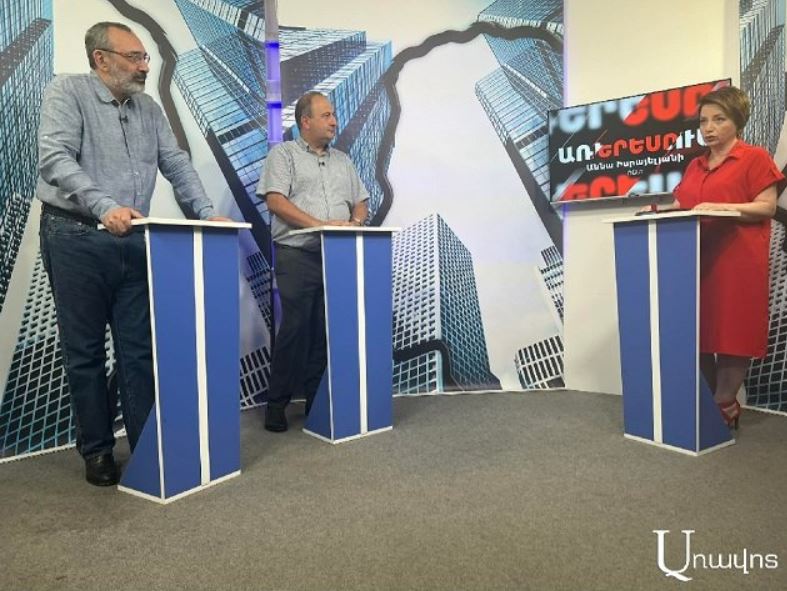In the fall of 2020, Prime Minister Nikol Pashinyan announced that “Turkey has returned to the South Caucasus to continue the Armenian Genocide” and “terrorists imported from the Middle East are fighting on the side of Azerbaijan under the patronage of Turkey,” and then publicly asked Azerbaijan and Turkey: “Do you want to destroy Armenia or not? Do you want to destroy the Republic of Armenia or not?
Do you want to continue and complete the genocide of the Armenian people or not?” The guest of Aravot’s “Areresum (Confrontation)” program, Dean of YSU Faculty of Oriental Studies, Doctor of Historical Sciences, Professor Ruben Melkonyan, answered the question whether there has been a change in the politics of Turkey since then.
“There is no positive change, only constant negative. And that persistent negativity is spiced up with classic manifestations of hate speech, the bearers of which are the Turkish Foreign Minister and the President of Turkey, whose public speeches are full of hate speech. And both the state of Armenia and the Armenian people and RA citizens are being targeted.”
On July 1, Armenian and Turkish envoys Ruben Rubinyan and Ambassador Serdar Kilic held the fourth meeting in Vienna. “The parties have agreed to ensure the possibility of crossing the Armenia-Turkey land border in the shortest possible time for citizens of third countries visiting Armenia and Turkey, respectively, and have decided to start the necessary processes in that direction.”
Read also
“The mountain gave birth to a mouse”, this is how the other guest of the program, extraordinary and plenipotentiary ambassador, former Minister of Foreign Affairs of the Republic of Artsakh Karen Mirzoyan, who was the RA representative in the Istanbul office of the Black Sea Economic Cooperation Organization for 5 years, evaluated this arrangement. He mentioned that he did not think that the Armenian diplomats had gone to negotiate on the facilitation of border movement of citizens of third countries. By the way, Karen Mirzoyan mentioned that this is not a new idea. “At various stages, this idea was discussed at the level of NGOs and unofficial representatives, but in a completely different context, as a tool for the development of tourism in the region.”
However, there are analyzes that the first addressee in this case is Azerbaijan itself, as Ambassador Extraordinary and Plenipotentiary Dzyunik Aghajanyan told “Hraparak.” “Because the shortest way for citizens of other countries to travel to Turkey is not Armenia.” Karen Mirzoyan considered the concerns to be justified. “The created situation is really worrying and needs additional clarification from them. The clarifications that have been made are not enough, on the contrary, they confuse the picture even more and increase people’s worries and concerns.” Ruben Melkonyan added, “Opening the border for citizens of third countries does not imply any benefit for the citizens of Armenia, moreover, it increases the security risks, because not only the citizens of Azerbaijan, but also the citizens of other countries can try to pass through Armenia to Turkey. And Armenia is actually turning into an international corridor. That is, we are not the state of Armenia, but the corridor of Armenia.”
According to the analysis of the Dean of the Faculty of Oriental Studies of YSU, this is not a diplomatic success, but a direct step taken to show that “in any case, we have taken a half step from the dead point, although you will not feel that half step, dear proud citizens, but we have done it anyway.” It became known that demining works are being carried out in one of the villages of Kars province near the Armenian-Turkish border. This is presented as a result of negotiations on the settlement of Armenian-Turkish relations.
However, Karen Mirzoyan mentioned, “The entire length of Turkey’s borders has been mined since the Cold War. And after the collapse of the Soviet Union, when the borders of Turkey, especially in that direction, began to open, it was quite a serious problem. The Turkey-Syria border was another heavily mined section. About 10-15 years ago, Turkey started a big border demining program, and Israeli companies are quite active in that program.” In this context, emphasizing the demining of the Armenian-Turkish border, he connects more with “the desire of the Turkish authorities to create an impression that there is any progress in this process.”
According to the Ambassador Extraordinary and Plenipotentiary, “All this is aimed at the Turkish side to show the world that we have a fairly successful process with the Armenian side and have already reached quite important agreements.” The parallel process is the overhaul of the 8.5 km section of the interstate highway “Turkey border-Margara-Vanadzor-Tashir-Georgia border” in Armenia.
Ruben Melkonyan joked about this. “As they say, they receive mutual positive messages. I suppose they don’t see the “positive” Bayraktars, they see only the positive impulses. There is demining, here is asphalt paving. I guess this streak will continue.”
Anna ISRAELYAN




















































